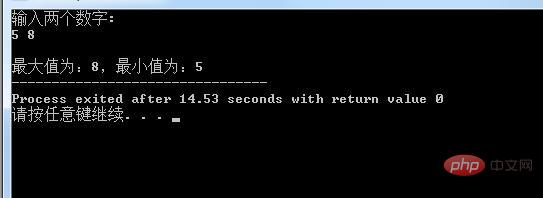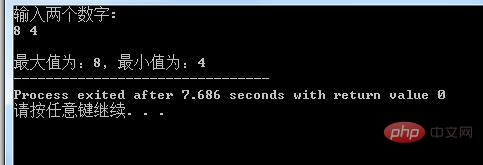有时我们需要从通过一个函数返回多个值,不幸的是C/C ++不允许这样做;但我们可以通过一些巧妙的方法来达到这种效果。下面本篇文章就来给大家介绍C/C++从函数中返回多个值的方法,

方法一:通过使用指针:
在函数调用时,传递带有地址的参数,并使用指针更改其值;这样,修改后的值就会变成原始参数。
下面通过代码示例来看看如何实现。
示例:输入2个数,比较大小后重新输出
#include <stdio.h>
void compare(int a, int b, int* add_great, int* add_small)
{
if (a > b) {
// 变量a存储在指针变量*add_great所指向的地址中
// 变量b存储在指针变量*add_small所指向的地址中
*add_great = a;
*add_small = b;
}
else {
*add_great = b;
*add_small = a;
}
}
int main()
{
int great, small, x, y;
printf("输入两个数字: \n");
scanf("%d%d", &x, &y);
// 最后两个参数是通过给出内存位置的地址来传递的。
compare(x, y, &great, &small);
printf("\n最大值为:%d,最小值为:%d",
great, small);
return 0;
}输出:

方法二:通过使用结构
因为结构是用户定义的数据类型;我们可以定义一个包含两个整数变量的结构,并将更大和更小的值存储到这些变量中,然后使用该结构的值。
示例:
#include <stdio.h>
struct greaterSmaller {
int greater, smaller;
};
typedef struct greaterSmaller Struct;
Struct findGreaterSmaller(int a, int b)
{
Struct s;
if (a > b) {
s.greater = a;
s.smaller = b;
}
else {
s.greater = b;
s.smaller = a;
}
return s;
}
int main()
{
int x, y;
Struct result;
printf("输入两个数字: \n");
scanf("%d%d", &x, &y);
// 最后两个参数是通过给出内存位置的地址来传递的。
result = findGreaterSmaller(x, y);
printf("\n最大值为:%d,最小值为:%d",
result.greater, result.smaller);
return 0;
}输出:

方法三:通过使用数组
当一个数组作为参数传递时,它的基地址将传递给该函数,因此无论对数组副本所做的任何更改,它都会更改为原始数组。
注:该方法仅当返回的项具有相同类型时才可以工作。
示例:使用数组返回多个值,会在arr [0]处存储更大的值,在arr [1]处存储更小的值
#include <stdio.h>
// 将较大的元素存储在arr[0]中
void findGreaterSmaller(int a, int b, int arr[])
{
// Store the greater element at
// 0th index of the array
if (a > b) {
arr[0] = a;
arr[1] = b;
}
else {
arr[0] = b;
arr[1] = a;
}
}
// Driver code
int main()
{
int x, y;
int arr[2];
printf("输入两个数字: \n");
scanf("%d%d", &x, &y);
findGreaterSmaller(x, y, arr);
printf("\n最大值为:%d,最小值为:%d",
arr[0], arr[1]);
return 0;
}输出:

以上就是本篇文章的全部内容,希望能对大家的学习有所帮助。更多精彩内容大家可以关注自由互联相关教程栏目!!!
以上就是C/C++函数如何返回多个值?(代码示例)的详细内容,更多请关注自由互联其它相关文章!
